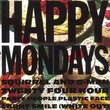Disappointing Mahler Lite
Ralph Moore | Bishop's Stortford, UK | 07/31/2009
(2 out of 5 stars)
"First impressions can be proleptic of a more considered response. I found myself instantly irked by being confronted by multiple images of the conductor's face, twice on the front of the booklet, once on the back and again on the reverse of the CD. Mr Järvi might be a fine conductor but a pin-up he is not, and I do not think he is yet ready to be presented à la Karajan or Bernstein, in soulful, gnomic pose, air-brushed and graphically tweaked to look like an Old Master oil painting and gazing out upon the hapless music-lover for all the world like La Gioconda. You need already to have generated some epic status to carry that off. Why do record companies feel the need to massage the ego of a would-be "sleb" conductor like this?
Having got that out of my system, let's turn to the music. I suppose my irritation was intensified by my finding the content of this disc so disappointing. I could argue that it is disingenuous of other critics to complain that the programme here is disjointed; it is what it says it is and could be of interest to Mahler tyros and buffs alike, in that it variously presents original, alternative, discarded, incomplete and re-arranged movements from four great symphonies. The idea is not without merit, but the sequencing and execution of the four pieces here is unsatisfactory. We begin with two mighty movements from two very different worlds: the apocalyptic vision of the "Totenfeier" with its granitic blocks of sound, followed by the subtle chromaticism and sublime, painful ecstasy of the Adagio - which should surely never be followed by anything, either in concert or on disc. The effect is bathetic when we descend to comparatively slight trifles such as Britten's charming arrangement of "Was mir die Blumen in der Wiese erzählen" and the "Blumine". Järvi's pallid rendering confirms that Mahler was quite right to cut the latter from the "Titan", as it is not his most inspired creation. In any case, surely these two movements should have opened the disc rather than act as encores or bon-bons; they belong chronologically and emotionally to Mahler's earlier artistic development, in the world of "Das Knaben Wunderhorn". We really don't want funeral rites before flowery meadows.
This would matter less if the performances themselves were more recommendable, but they chime with the current penchant for "Mahler Lite". While I have little taste for it myself, I concede that a sparer, pared down approach to Mahler can afford new insights, but it must be done better than it is here. There isn't too much to say about the execution of the two slighter movements here except that they are efficiently and prosaically despatched, evincing little feeling for their poetry. "Blumine" is, in any case, too lightweight for the First Symphony as a whole which is why Mahler correctly decided to excise it from the finished work. Britten's reduced orchestration version of "What the wild flowers tell me" was simply a sensible, practical and reverential expedient to try to get Mahler played more widely at a time when the inclusion of any of his music in a concert programme was still a comparative rarity. (Incidentally, it was Britten who introduced "Blumine" to the British public, too.)
Inevitably it is the quality of the two longer, more serious and substantial movements which matters most, as the other two items are essentially fillers. While there are subtle differences in the orchestration and rhythmic details between the original "Totenfeier" and its eventual form, the two versions are sufficiently alike to permit comparison between classic recordings by Klemperer and Rattle and this new one. I have to say that these comparisons are all to Järvi's disadvantage. While he secures clean, clear articulation of the musical argument, this clarity is achieved at the expense of excitement; he engenders none of the tension which characterises both Klemperer's famous live and studio recordings. Klemperer's attack and use of stringendo are electrifying; his attention to moulding the phrases and grading the dynamics creates a maelstrom of sound building inexorably to the climactic cymbal crash. Rattle works differently, showing more restraint. His double basses in the opening measures have been asked to think hard about phrasing and shading. A terrible sense of foreboding pervades the music until the shattering entry of the brass. Järvi provides no such arcing overview; there are sudden fortissimos without preparation or reason, the scurrying downward motion of the strings carries little sense of a descent into panic and the music essentially goes to sleep just where it should take off. The problem is not one of timing but shaping. There is a blandness, a lack of conviction here; Järvi fails to imbue Mahler's music with inner life and tension. Rattle's account of the Adagio from the completed Tenth Symphony with the Belin Philharmonic sounds so much grander and statelier - yet a glance at the timings confirms that he is unbelievably almost two minutes faster. In any case, I suspect that few Mahler fans want any longer to hear just the Adagio as an appendage now that we have become used to hearing the Tenth in its entirety in excellent completions such as Deryck Cooke's.
This disc has fine orchestral playing in excellent sound, but I can find little to praise. Järvi received rave reviews from the press Frankfurt when he performed this music in concert, yet one observation from the Frankfurt Rundschau critic is telling: "Anyone who favours lush, Hollywood-style Mahler will not feel at home with Järvi and his orchestra." If "Hollywood-style" is meant to refer to Bernstein's way with Mahler, I'll go with Lennie any day - yet this absurd jibe is refuted merely by listening to Klemperer...and I do not recall anyone trying to accuse him of being in any way "Disneyfied" as a conductor.
"
Low-key, pleasant readings in a catch-all CD
Santa Fe Listener | Santa Fe, NM USA | 08/04/2009
(3 out of 5 stars)
"I certainly can't disagree with the general outline of the preceding two-star review. Paavo Jarvi is a temperate condcutor of Mahler, burning about as bright as Tilson Thomas, David Zinman, and Christoph Eschenbach but dimmer than another unexaggerated Mahlerian, Ricardo Chailly. They're all old maids compared with Leonard Bernstein, but since there has always been a backlash against Bernstein's passsionate, at time apocalyptic way with Mahler, the older conductors just mentioned have a following. Their guardian angel, I suppose, is the cool, precise Boulez. Jariv is more cautious than Boulez, however, and less in control of orchestral timbres and balances.
You can get Totenfeier, the tone poem that Mahler later transformed into the first movement of his "Resurrection" Sym., from either Chailly and Boulez, both of whom carve a stronger profile. what Jarvi gives us is a pastel sketch, pleasant but hardly stirring. There's even stiffer competition, and a wealth of it, in the cathartic Adagio of the Mahler Tenth. In all tese four disparate movements it helps greatly to have a virtuoso orchestra at your command, which Jarvi lacks in Frankfurt. It seems a bit peverse of him to be so lulling when the clear intent of the music is to be shattering and anguished. a host of rivals have nothing to worry about, including Bernstein, Tennstedt, and Abbado, just to mention my current favorites. "blumine," the discarded pastorale interlude from the Mahler First, find Jarvi on sager ground, delivering a quick-paced sisnging account that's as pleasant as the music itself. One wonders why the composer kept including it in his performances for so long, given the mismatch with the trubulence of the other four movements. "What the wild flowers tell me" from Sym. 3 is delicately handled and quite respectable on the whole.
I don't quite see the rationale for this catch-all CD, and my reaction to it is tepid."
What the Clock Tells Me....
Steven C. Myers | Bedford , PA USA | 08/23/2009
(3 out of 5 stars)
"Any student of German 18th-19th Century romantic literature knows about the "Blaue Blume" (Blue Flower) Period. Then, poetic writers arose and flourished as the Classical Period and its formalism and 'storm and stress' receded.
Gustav Mahler and I encountered each other while I was a college student - studying German Literature, no less! I was overwhelmed by his music and, in my own Blue Flower moment, obtained every available recording of this maestro's work.
In the ensuing 45 years, my enthusiasm for Mahler remains firmly anchored in the psyche - but my reasoning for it has changed, and I assign to this excellent recording a different grade than I would have, four decades ago.
Upon listening to Jarvi's interpretations the first time, I found cool, technical precision of an admirable execution - but little passion. It was as if Werner Heisenberg or some other great physicist had been on the podium, leading an orchestra of world-class scientists solving incredibly complex mathematical problems.
In short, the recording, to my ear, is better found in a laboratory than in a concert hall, and that, while its audience enters the hall with more hope for sensuality than for empirical analysis, the Scientific Method prevails.
Unfortunately, we experience more real numbers than real ardor in this technically tight recording. Having listened to it several times, I fear that it tells us that the Blaue Blume Period is gone forever."


 Track Listings (4) - Disc #1
Track Listings (4) - Disc #1



